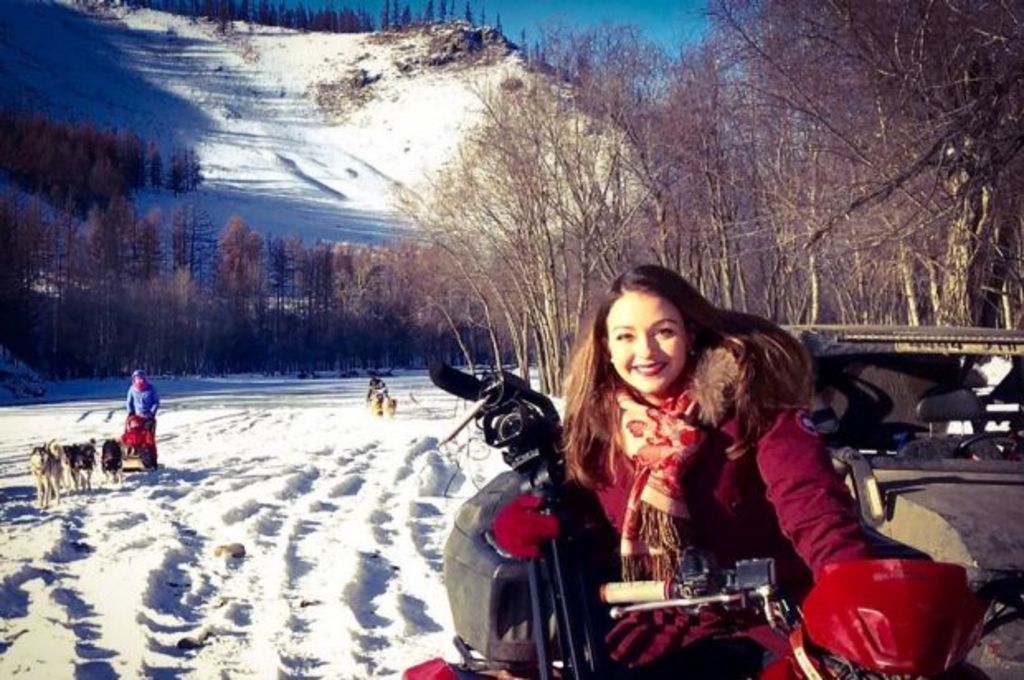From Sydney to Ulaanbaatar: Grace Brown's new life in Mongolia

Mastering the art of riding a camel through the Gobi Desert while presenting a television show wasn’t exactly something Grace Brown imagined she would do in her lifetime.
Neither was filming dog sledding on a frozen river, or working in temperatures as low as minus-30 degrees, but that hasn’t stopped the journalist from making the most of her new life in Mongolia.
“My friends thought (moving to Mongolia) was crazy, but I’ve convinced a few to visit,” the freelance video journalist said. “It’s so beautifully wild in many parts, the nature is so spectacular … and being in a remote place like this means you definitely have more opportunities.”
After finishing a double degree in law and international studies, the University of Sydney graduate moved to Hong Kong for a year, then onto Beijing for three years, before relocating to the Mongolian capital of Ulaanbaatar with her husband, Nick Edwards, in August 2015.
Since making the move, Brown, who is a beginner in Mongolian, has worked for DeFacto Review, Mongolia’s first English language news show and has hosted weekly talk show Talk With Me. She has also contributed to several major news outlets across the world and has worked as a media consultant for the United Nations development program.
“I’ve learned so much in Mongolia, including how to film, because decent camera operators here are hard to find. I also got much more comfortable presenting through the talk show … I even learned how to host on a horse and camel,” she said.
Brown, who counts interviewing the Dalai Lama and Aisholpan Nurgaiv – The Eagle Huntress – as two career highlights from her time in Mongolia, said her favourite part about her job was the people she got to meet.
In her time off, Brown and Edwards like to spend their time exploring the countryside, and have relished the unique opportunity to go dog sledding on frozen rivers, horse riding across snowy mountains and road tripping through incredible forests.
While in the city, Brown enjoys ballets and live Mongolian music, singing karaoke in a wacky bar in a decrepit, Soviet-era building “where the floor shakes if you jump too much”, and having dinner parties to escape the sub-zero temperatures.
“It is very easy to make friends here. Everyone takes you in as a newbie and welcomes you … the expat community is very small here so everyone knows each other. Combine that with the sub-zero temperatures and you become like family very quickly,” she said.
In Ulaanbaatar, home to about 1.3 million people, more than half the population live in felt gers (Mongolian yurts) surrounding the city, which has seen a population boom in recent decades, as herders leave behind the countryside due to increasingly harsh weather conditions making their traditional livelihoods unviable.
“The ger districts they live in are like shanty towns; often several families share one yard with one outdoor toilet, which is hard in minus-30 degrees,” Brown noted. “They go without running water, sanitation or central heating. As a result of the extreme winter, most of those families burn coal and sometimes rubber tires to survive. In some of those districts, air pollution readings during winter are four times worse than Beijing’s smog.”
In a bid to reduce the dangerous levels of air pollution, the government has placed a ban on migration to the city, which prevents anyone except those who require long-term medical treatment or those who have bought an apartment from moving in until next year.
Housing, though, is expensive. Brown said two-bedroom apartments with western-style finishes in downtown Ulaanbaatar were generally about $US2000 a month to rent, but supply far outstrips demand. “There are many luxury apartment blocks standing empty or half finished, while affordable apartments remain scant; you could say there’s a property bubble here.”
Brown said seeing the harsh conditions people, especially children, lived in made her appreciate the way of life offered in Sydney.
Though Brown missed being able to go to the beach, frequenting the bars and cafes of Newtown’s King Street, exotic fruits and Vegemite, she doesn’t have any plans to leave Mongolia just yet.
“I think I will stay a while longer, but not forever. Sooner or later my husband and I want a new chapter. I wouldn’t rule out Australia some day, but at the moment it’s more likely Asia,” she said.
“Living overseas has made me grow in ways I probably wouldn’t have if I had never left. It wasn’t always easy, but I have incredible memories to look back on. Every day is an adventure.”
We recommend
We thought you might like
States
Capital Cities
Capital Cities - Rentals
Popular Areas
Allhomes
More







